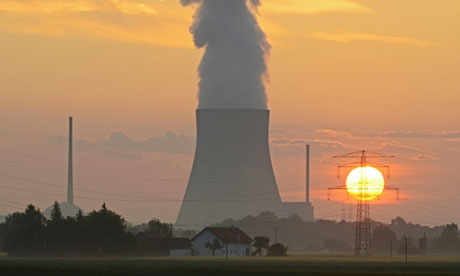Germany is right to opt out of nuclear
The rejection of nuclear power is a result not of German angst but of economic thinking. We must invest in renewable energy

"You Germans are on your own" was the reaction of Stewart Brandt, the American environmentalist, to Germany's plans to exit nuclear energy. He also added that Germany's decision was irresponsible. Economic considerations and the threat represented by greenhouse gases meant that we simply could not renounce nuclear energy. George Monbiot andMark Lynas have argued along similar lines.
Having been a member of the special expert commission appointed by the German chancellor, Angela Merkel, in the wake of Fukushima, I disagree. Ultimately, the rejection of nuclear is not a result of German angst but of economic thinking. In the long run, nuclear power will become more expensive, while renewable energy will become cheaper. But the key point is that those who continue to leave all options open will not invest.
A hesitant Germany would fail to achieve the push of self-fulfilling prophecy in energy change that is required. Supporters of nuclear energy block their own access to the markets of the future because they are not investing in energy-saving products and in renewable energy – not even in "green" professional training and research institutes.
The situation we are facing at the dawn of the 21st century is comparable to other turning points in energy generation. Just imagine what would have happened 250 years ago if people had brushed aside the suggestion that they should invest in coal and steel, steam engines, power looms and, later on, railways.
Or what the world would be like now if 50 years ago people had seen the Americans suddenly investing in microprocessors, computers, the internet and the new markets that those technologies opened up and dismissed it all as the product of American angst.
If we could open up just a part of the world's deserts for solar energy, we could satisfy the energy needs of the whole of civilisation. No one can take possession of sunlight; no one can privatise or nationalise it. Everyone can open up this source of energy for himself or herself and profit from it. Users of energy produced by a nuclear power plant have their electricity cut off if they fail to pay their bills. This cannot happen to people using electricity generated by the solar panels installed on the roofs of their houses. Why, of all nations, do the Americans, the French and the British – nations that value freedom so highly – persist in remaining blind to these emancipatory consequences of the coming change in power generation?
People everywhere are proclaiming and mourning the death of politics. Paradoxically, the cultural perception of the danger may well usher in the very opposite: the end of the end of politics. To understand this, we need to go back to John Dewey's insight, formulated as early as 1927, in The Public and its Problems.
According to Dewey, a transnational public sphere powerful enough to create a community arises not from political decisions, but from the consequences of decisions that have come to seem problematic in the lives of citizens. Thus a publicly perceived risk triggers communication between people who would otherwise prefer to have nothing to do with one another. It imposes obligations and costs on people who resist – and who often have the prevailing law on their side. In other words, what is denounced by many as a hysterical over-reaction to the "risks" of nuclear energy is in fact a vital step towards ensuring that a turning point in energy generation becomes a step towards greater democracy.
The novel coalition between the state and social movements of the kind we currently see at work in Germany now has a historic opportunity. Even in terms of power politics, this change of policy makes sense. Only a conservative government close to industry is capable of pulling off such a shift in energy policy.
It could well be that those who criticise Germany's decision to opt out of nuclear energy have fallen victim to the caterpillar's mistake: as it emerges from the chrysalis, it laments the disappearance of the cocoon because it has no premonition of the butterfly of renewable energy it is destined to become.

No comments:
Post a Comment